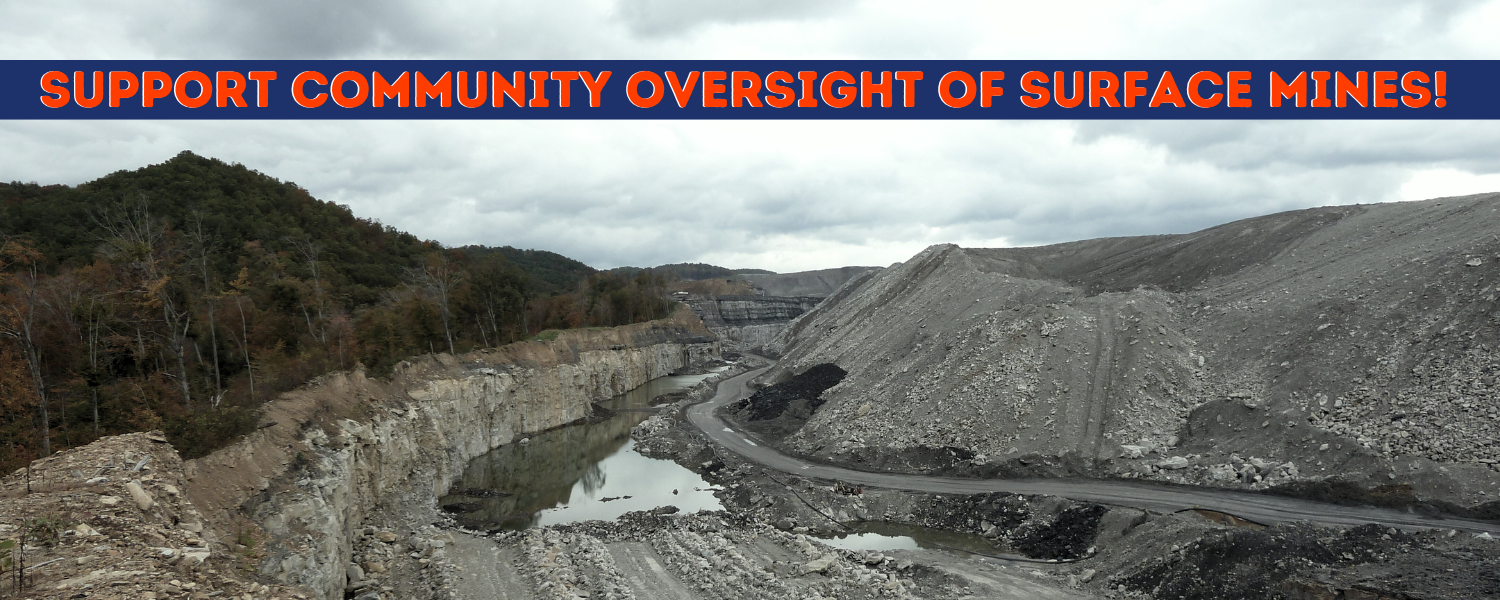Support the new surface mining oversight rule
Office of Surface Mining Reclamation and Enforcement

Community oversight of mountaintop removal and other surface coal mines is a key component of limiting harmful impacts to people and the environment. A new draft rule will give more weight to complaints from community members!
The Surface Mining Control and Reclamation Act is the federal law that controls all surface coal mining across the country. This law allows community oversight in several important ways, including the “10-day notice procedure.” Under the law, if any person informs the federal Office of Surface Mining Reclamation and Enforcement of a violation of the law at a coal mine, the agency must act to investigate and correct the violation.
In 2020, the Trump administration issued a rule to limit community members’ ability to effectively utilize the 10-day notice procedure. First, it allowed OSMRE to request additional information from state mining agencies before performing an inspection, creating unnecessary delays in oversight. Second, it exempted violations by state regulators — such as issuing a defective permit that violates the law — from this form of federal oversight. These changes allowed state regulatory agencies to evade accountability for coal mining issues identified by community members.
Under the current administration, the agency has issued a new rule to address the problems created by the 2020 rule. It limits OSMRE to reviewing information provided in the complaint and within the agency’s own files, rather than allowing requests for additional data from state regulatory authorities before taking action. It treats community complaints as requests for federal inspection and allows community members to accompany federal regulators on inspections. It includes “permit defects” created by state agency action as matters that can be addressed through the 10-day notice procedure. And it provides stricter timelines and types of actions that qualify as an appropriate response.
The new rule allows for an appropriate balance between community participation, state autonomy and federal oversight.
Please submit the comment below, and feel free to edit to add your own personal experiences with impacts from coal mining.
Sponsored by
To:
Office of Surface Mining Reclamation and Enforcement
From:
[Your Name]
Dear Acting Director Owens:
I am writing to express my support for the draft rule proposed by the Office of Surface Mining Reclamation and Enforcement regarding the 10-day notice procedure (Docket ID: OSM-2022-0009).
The 10-day notice procedure is a critical tool for community members to participate in oversight of surface coal mining and ensure that impacts to people and the environment are minimized. Though state and federal agencies should do everything in their power to identify and correct violations of the law, community members may identify problems missed by regulators. In other cases, initial responses by state regulators may not adequately address violations. In these cases, there must be an effective way for community members to work with regulators to address known issues.
The proposed rule addresses several issues that arose through the 2020 rulemaking. The new rule allows OSMRE to consider information in a complaint as well as additional information in publicly available electronic data, and OSMRE’s own information. I support this change, as it limits potential delays in federal inspection and oversight.
The new rule proposes treating all citizen complaints as requests for federal inspection. I support this change, as many community members are not experts in SMCRA, may not use specific regulatory language or may not explicitly ask for OSMRE to conduct an inspection. It is self-evident that bringing a violation to the attention of federal regulators implies a desire for those regulators to take action.
The new rule removes the requirement for a citizen to also notify the relevant state regulatory authority when requesting a federal inspection. I am in support of this change. In most cases, community members have already contacted state agencies about the same or similar problems. In many cases, community members may be unclear about which agency to contact or how multiple violations may relate to one another, for example in the case of ongoing or recurrent water pollution or erosion issues. This change will reduce the number of steps community members may have to take to address a violation, and will allow federal regulators to use common sense regarding their response to complaints.
The new rule reinstates the use of the 10-day notice procedure for permit defects. This is an important change because many problems that arise at mines originate from issues with the mining permit. This provision allows OSMRE to conduct oversight of state agency actions, as intended under SMCRA.
While there are ways that OSMRE could further strengthen this rule to better protect community members, I feel that it is most important to issue this rule in a timely manner. The 2020 10-day notice rule has created unnecessary delays in addressing impacts from coal mining. Implementing this rule as soon as possible, with no extension of the comment period, would be most beneficial to impacted communities.
